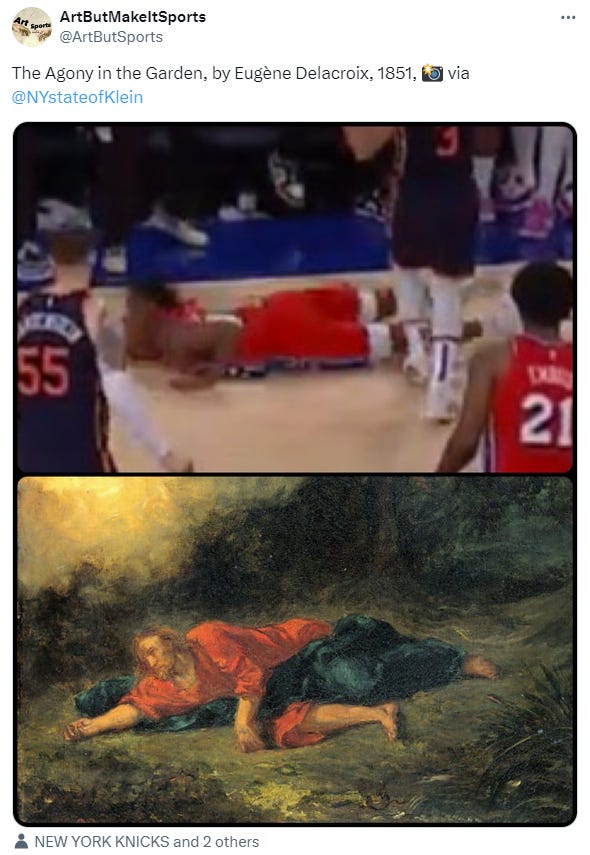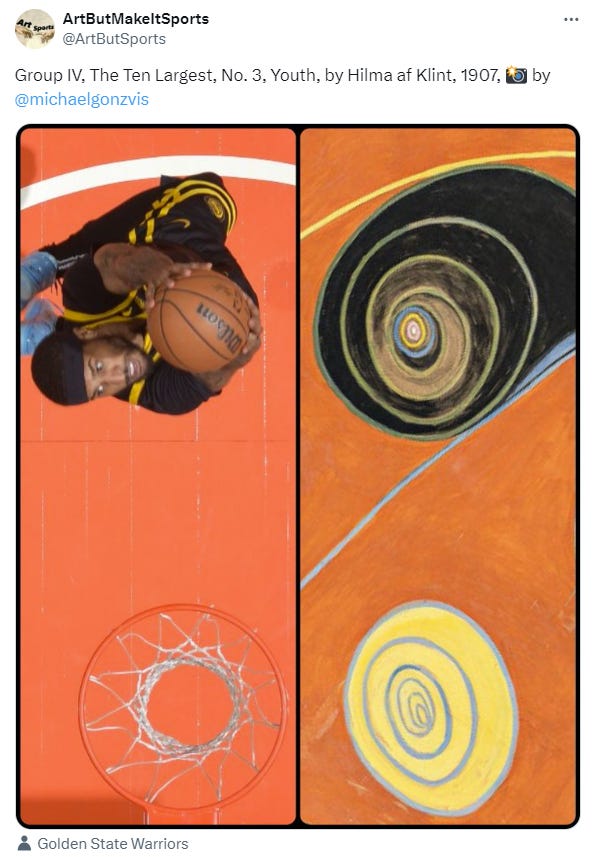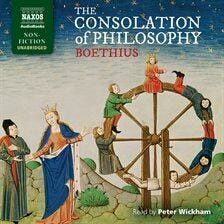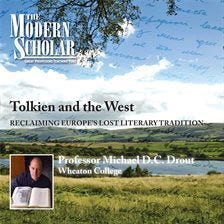It’s Sunday, so time for some fun.
Sumo Singing!
The Grand Sumo Tournament is only in odd-numbered months, so the top wrestlers often do promos, fundraising, and other activities in even-numbered months.
Recently, top wrestlers did a charity event for earthquake victims.
Here is Sumo Kaboom this last week covering the event, specifically the karaoke part:
Here is the video of the event (and turn on the captions! It won’t let me to set that — click on CC, then click on the gear, change to auto-translate and choose English (or your preferred language.))
My favorite is Hiradoumi at 26:15, performing “Rising Sun” — it’s very upbeat.
Yes, Takayasu, the smooth crooner, wraps it all up, but Hiradoumi really gets the crowd clapping.
Art in Unexpected Places
One of my favorite X/twitter accounts is ArtButMakeItSports. Here is his substack:
Just a handful from the account (some are older, from prior playoffs):
What’s nice is he’s got a whole portfolio of artworks to draw from, from medieval and Renaissance, up to very modern pieces. I learned about some artists I didn’t know in following his account.
Sometimes he matches just to a detail in a painting or to the entire painting, to a theme but often to composition.
Audiobooks I Recommend
I finally got around to Boethius’s The Consolation of Philosophy.
The audiobook version I listened to was a translation by Peter Walsh, read by Peter Wickham, and produced by Naxos. I got it via hoopla digital, through Westchester County Libraries. I imagine many libraries have it.
The image is the Wheel of Fortune (not to be confused with the game show… or maybe….)
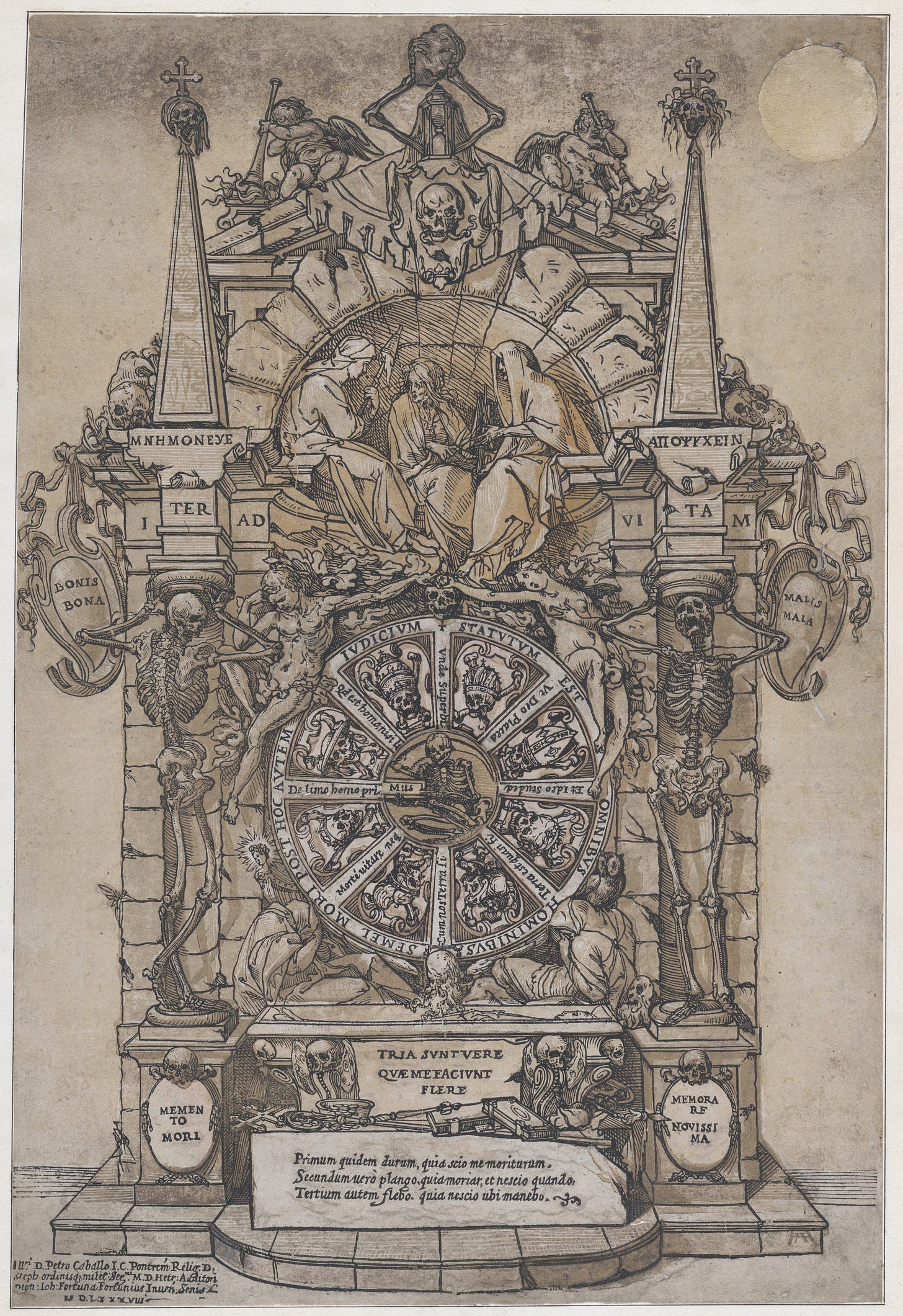
It is fairly short, with a personified Lady Philosophy telling Boethius to suck it up (okay, I’m being harsh), but telling him that ultimately, all people get what they deserve, in that the goods of the material world are but dust, etc. I happen to agree with the overall philosophy (being Catholic), but some of the specifics don’t quite work, in that Boethius died in 524 AD, and reflects the scientific understanding of the time.
Speaking of when Boethius died, let me mention how and why he died: he pissed off the powers-that-were. He pointed out how corrupt the local powers were, he defended somebody who was scapegoated, and then after being exiled, instead of bootlicking, he stuck to what he said. The Consolation of Philosophy was written during the exile/jailing.
As to the method of his death, he was definitely executed. But the specifics….
The method of Boethius' execution varies in the sources. He may have been beheaded, clubbed to death, or hanged.[52] It is likely that he was tortured with a rope that was constricted around his head, bludgeoned until his eyes bulged out; then his skull was cracked.[53][54]
Anyway, it was likely nasty. I knew all of this when I was listening to the audiobook, and it was pretty clear that Boethius knew what he was facing, when you pay attention. It would have been very easy for him to say “No, no, I was wrong, emperor, I’m wrong.” But he stuck to it.
I want you to think about that — there have been people killed because they were in the wrong place at the wrong time, but there were people like Thomas More or Boethius, who knew that when they made their choice, they would be put to death.
Let me give you something more pleasant — it’s not exactly an audiobook, but a set of lectures, which I also picked up via hoopla through my library: Tolkien and the West, by Prof. Michael Drout
It’s a set of 8 lectures of ~45 minutes each, and Drout is connecting Tolkien’s fictional work with his scholarly work as an Anglo-Saxon professor at Oxford, as well as other scholarly structures in The Hobbit, Lord of the Rings, The Silmarillion, and some other bits within Tolkien’s fiction. I’m not a total Tolkien geek, but I know quite a lot… and I learned some new stuff. It was nifty.
The Modern Scholar lecture sets are often found in libraries. I first encountered other Drout lectures at my library in CD sets about 10 years ago.






